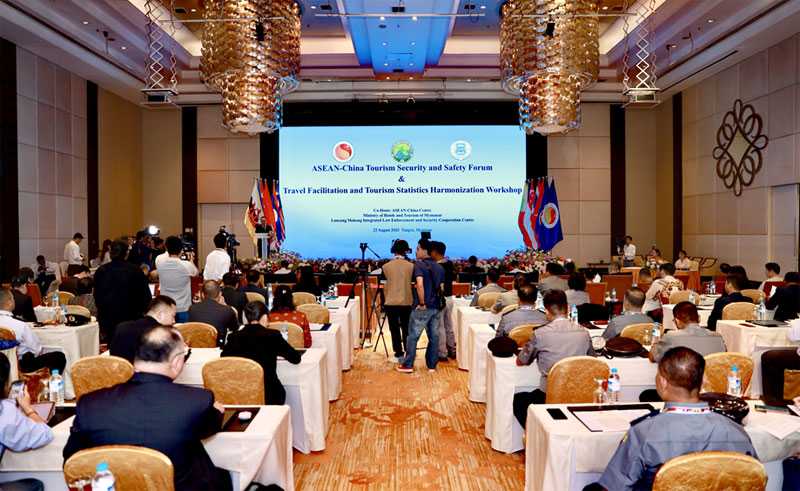Yangon, August 25 (AseanAll) — On 25 August, 2025, the ASEAN-China Tourism Security and Safety Forum was successfully held in Yangon, Myanmar. The Forum was jointly organised by the ASEAN-China Centre (ACC), the Ministry of Hotels and Tourism (MOHT) of Myanmar, and the Lancang Mekong Integrated Law Enforcement and Security Cooperation Centre (LM-LECC).

Distinguished participants included Shi Zhongjun, Secretary General of the ASEAN-China Centre, Jeng Phang Naw Tawng, Union Minister, Ministry of Sports and Youth Affairs and Ministry of Hotels and Tourism of Myanmar, Soe Thein, Chief Minister of Yangon Region, and You Xiaowen, Secretary General of the Lancang Mekong Integrated Law Enforcement and Security Cooperation Centre. The event brought together over one hundred officials including experts, industry representatives and diplomats from China's Ministry of Foreign Affairs, representatives from ten ASEAN Member States, the ASEAN Secretariat, ASEANAPOL Secretariat, the Mekong Tourism Coordinating Office, envoys of ASEAN countries to Myanmar, and nearly 20 media outlets from across China and ASEAN.
This was the first forum focusing on tourism security and safety between ASEAN and China, to explore practical solutions and institutional cooperation to build stronger security for regional tourism and prosperity. The forum also adopted the Initiative on ASEAN-China Tourism Security and Safety for Regional Sustainable Development.
In his keynote address, Shi Zhongjun stressed that tourism is not only a vital driver of regional economic growth but also a key channel for people-to-people connectivity. While ASEAN tourism is showing signs of recovery after the pandemic, challenges such as security threats, telecom fraud, misinformation and regional conflicts continue to undermine public trust and restrict development. He called for strengthened domestic and regional collaboration in dealing with tourism safety and security, and proposed four priorities: deepening policy and security cooperation, balancing safety with sustainable development, enhancing tourism capacity building, and promoting digital innovation and governance. SG Shi urged all parties to jointly build a safer, more prosperous ASEAN-China tourism ecosystem, enrich the 2025 ASEAN-China Year of People-to-People Exchanges and work toward a closer China-ASEAN community with a shared future.
In a video message, Secretary-General Dr. Kao Kim Hourn of ASEAN stressed that tourism links both culture and economy, and safeguarding it is essential to restoring public confidence and advancing inclusive, balanced, and resilient growth. He underscored that ensuring tourism safety is integral to the ASEAN Vision 2045, and urged ASEAN states to share responsibility, strengthen cooperation and allow tourism to enhance mutual trust and development. Dr. Kao Kim Hourn also praised China’s recent visa facilitation measures for ASEAN visitors, highlighting the vast potential of ASEAN-China cooperation in tourism safety and needs for enhanced tourism security cooperation with China to create a model of common development and prosperity.
Union Minister Jeng Phang Naw Tawng highlighted the need to address not only security threats but also non-traditional challenges such as public health, natural disasters and environmental degradation. He called for building high-standard safe tourism destinations and reinforcing security barriers as the foundation for tourism and economic growth. He reaffirmed Myanmar’s commitment to deepening China-Myanmar cooperation and enhancing tourism safety capacity, while praising the forum as a valuable platform for sharing best practices and promoting sustainable development.
Davuth LY, Deputy Secretary General of the Lancang Mekong Integrated Law Enforcement and Security Cooperation Centre, noted that 2025 is both the ASEAN-China Year of People-to-people Exchanges and a critical stage for post-pandemic recovery. He emphasized the importance of tackling intertwined traditional and emerging risks to tourism safety through intelligence sharing and joint operations within such cooperation frameworks as the Nay Pyi Taw Declaration. He urged all parties to take the forum as an opportunity to deepen security cooperation and foster a safe, accessible and sustainable tourism environment.
Delegates from China, Thailand, Indonesia, Malaysia, Cambodia, the ASEAN Secretariat and others held in-depth discussions on issues including regional security challenges, cross-border crime, policy coordination, intelligence sharing, tourism police training, new technologies application for safety, information security, public awareness and workforce development. Participants agreed that tourism cannot thrive without security, and that even isolated incidents can erode public confidence. They resolved to strengthen comprehensive security systems, ensure accurate information dissemination, and advance high-quality tourism connectivity. The forum reached consensus on institutionalizing this mechanism to sustain cooperation between ASEAN and China in security and tourism, recognizing the forum and the ASEAN-China Centre’s Initiative as vital platforms and roadmaps for regional action.
Following the forum, the ASEAN-China Centre and the Ministry of Hotels and Tourism of Myanmar co-hosted the ASEAN Travel Facilitation and Tourism Statistics Harmonization Workshop, exchanging views on building a more connected, open and flexible regional tourism system.